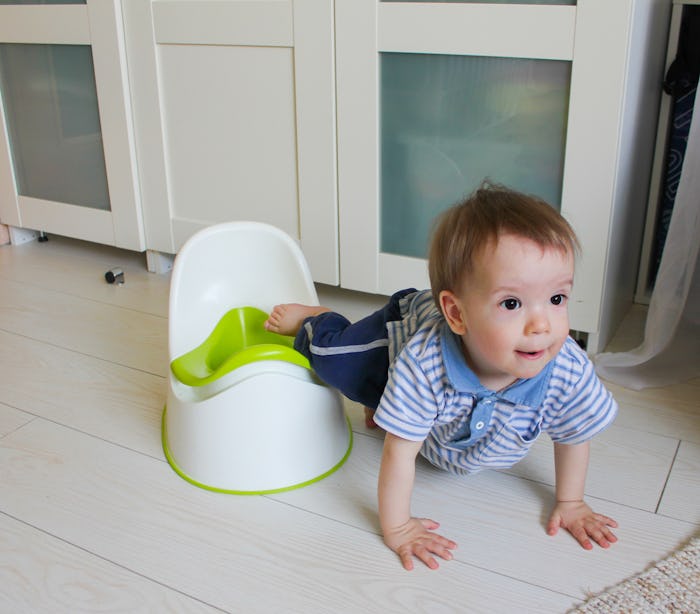When I brought my firstborn home, I was obsessed with worry that he wasn't soiling his diaper. The baby books had me so freaked out that I actually jumped up and down at the first poop. By his first birthday, I was so over the whole diaper thing that I started looking forward to seeing the signs of readiness for potty-training. In my case, however, well... let's just say it was a more of a wait than I'd hoped for. Same with my second child. More than once, I worried I'd be buying pull-ups for the rest of my life.
What I didn't realize at the time was that there's a wide range of "normal" when it comes to toilet training. The American Academy of Pediatrics (AAP) assured parents that while some children are ready to begin the process as early as 18 months, others may not be ready until after age two or even three. Although children's bodies may physically be able to hold in their waste, that doesn't mean they have the emotional maturity to train. Kids need to be able to recognize their body's needs, communicate them, and be capable of taking themselves to the proper spot. Even then, they may still need time to develop the internal motivation to say goodbye to diapers.
How can you tell when your child is ready to make the transition to those first big-kid pants? There are definite indicators to look for, so if you notice your child displaying one or more of these signs, you'll know you're on the road out of Diaperville.
1They're Fascinated By The Toilet
If your toddler constantly follows you into the bathroom, seems intrigued by looking into the bowl and flushing, or pretends to put their toys on the toilet, that's a good cue to start introducing the potty chair or reading a book like Once Upon a Potty or Potty, advised Parents.
2They Stay Dry For Long Stretches
By 18 months or so, a toddler usually has enough bladder and bowel control to be able to maintain a dry diaper for at least two hours, or to keep dry during naptimes, advised Zero to Three. If your child isn't quite there yet, it's better to hold off on potty training until they have longer dry spells.
3Their Schedule Is Predictable
If you know that your child usually needs to pee or poop first thing in the morning or right after mealtimes, that will make it easier to establish a potty-training schedule, advised What To Expect. You can also remind your child: "Breakfast is over — it's time to go to the bathroom."
4They Don't Like Feeling Dirty
There comes a point in a child's development when they feel uncomfortable enough in a dirty diaper to want to do something about it, explained Baby Center. If your child starts wrinkling their nose at their diaper, trying to take it off, or telling you they want to be changed, take it as a good opportunity to suggest trying the potty seat.
5They Can Dress Themselves
In order to use the toilet independently, your child will have to be able to pull their underwear and pants up and down easily. (We're talking a simple pair of elastic-waist pants or leggings here; no belts or complicated snaps.) You can start preparing your child for potty training by having them practice dressing themselves in the morning.
6They Hide From You
Children have to be aware of the fact that they're eliminating before they can learn how to toilet-train, according to the readiness list on Huggies' website. When they start realizing what their body is doing, your toddler may start making a telltale grunting noise, or call for your attention, or say, "I'm wet" or "I pooped." Some children may hide from Mom while they're pooping, and maybe even deny being dirty afterward (even as the odor is making your eyes water). The AAP suggests reinforcing this awareness by saying, "You look like you're about to pee. Can you feel it?" If you're sure that your child knows when they've gone, you can get the training process started, perhaps by showing them the Daniel Tiger's Neighborhood potty-training episode.
7They're Motivated To Train
You can buy the cutest potty seat, a pile of stickers, a library's worth of books, and be the most encouraging parents in the world, but none of this will do any good if your toddler simply couldn't care less about training. Some two-year-olds are just too active to focus on sitting down, while others may assert their sense of independence by refusing to go on the toilet, explained the AAP. Sometimes a child will resist training, or even regress after making progress, as a result of a disruption in the environment (such as a move or a new baby). And sometimes toddlers are afraid to use the potty because, to their minds, their pee and poop are a part of their bodies (would you want a part of you going down the drain?).
Trying to force a child who isn't emotionally ready will only result in frustration for you both, as well as possible health issues; a child can become severely constipated from holding back their poop. All experts agree that potty-training should be an unrushed process, reinforced with praise rather than shame or punishment. If that means your child is out of diapers a little later than their friends, so what? By the time they're in kindergarten, you'll wonder what you were so worried about. I know I did.
After experiencing a traumatic c-section, this mother sought out a doula to support her through her second child’s delivery. Watch as that doula helps this mom reclaim the birth she felt robbed of with her first child, in Episode Three of Romper's Doula Diaries, Season Two, below. Visit Bustle Digital Group's YouTube page for more episodes, launching Mondays in December.
